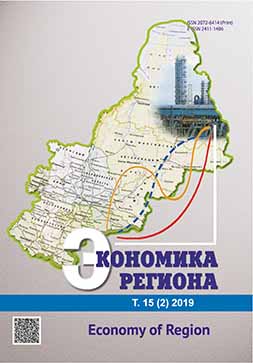РЕГИОНАЛЬНЫЕ ДЕТЕРМИНАНТЫ
ЭФФЕКТИВНОГО ИСПОЛЬЗОВАНИЯ ЧЕЛОВЕЧЕСКОГО КАПИТАЛА
В ЦИФРОВОЙ ЭКОНОМИКЕ
Regional Determinants of Effective Use of Human Capital in the Digital Economy
Author(s): Natalia Removna Kelchevskaya, Elena Viktorovna ShirinkinaSubject(s): Supranational / Global Economy, Labor relations, Human Resources in Economy, ICT Information and Communications Technologies
Published by: Институт экономики Уральского отделения Российской академии наук
Keywords: human capital; intellectual economy; wages; Mincer equation; regions of Russia; education; special competences; modelling; regression analysis; indicators;
Summary/Abstract: This article discusses peculiarities of the labour market functioning in the context of the digital economy development.It determines the main directions in the management of processes related to the accumulation and use of human capital as the production’s main factor in the context of digitalization. Our goal was to develop a multi-factor model of human capital efficiency in the digital economy. We used the materials of the Boston Consulting Group, the World Development Bank, and data from The Russia Longitudinal Monitoring Survey — Higher School of Economics (RLMS-HSE) as the study’s empirical base. Asa research methodology, we chose a regression analysis based on the initial sample of data from RLMS 25, wave 2016, “Data on IBM SPSS individuals”. For the study of factors, we utilized the traditional J. Mincer equation, supplemented by quantitative and qualitative variables. We proved that expanding the range of parameters increases the coefficient of determination and the statistical significance of the parameters. On the basis of the empirical material, we confirmed a number of hypotheses on the determinants of the effective use of human capital in the digital economy. Particularly, the hypothesis about the impact of production experience on wages as an indicator of returns to human capital, previously put forward and supported by J. Mincer and his followers, is not confirmed for the digital economy. Digital technologies, replacing the old working methods, render the previous skills and organizational approaches irrelevant. Transformations caused by the environment’s automation and digitalization change the working activities from clearly defined work responsibilities to design work. The development of skills in digital knowledge application is an essential factor for the effective use of human capital in the digital economy. These skills enable workers’ adaptation to changing work processes and the employers’ requirements. The study’s results show that the correct interpretation of the determinants that affect the efficiency
Journal: Экономика региона
- Issue Year: 15/2019
- Issue No: 2
- Page Range: 465-482
- Page Count: 18
- Language: Russian

